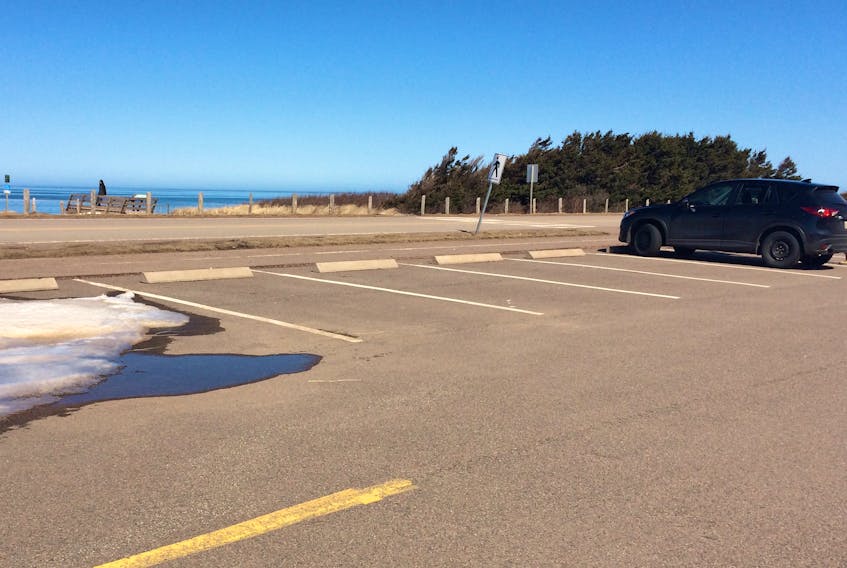I didn’t get the Parks Canada memo on Friday and must confess I was one of those visitors in the Prince Edward Island National Park on Sunday, however my experience is polar opposite to that described in The Guardian’s front-page story (Extra measures, April 1).
The memo I missed was that as of Friday there is a parking ban in the P.E.I. National Park. This decree, according to the story, is to limit visitation due to the coronavirus (COVID-19) pandemic (the virus that a few weeks ago the World Health Organisation insisted was not a pandemic, until it was).
The link to parking your vehicle in the P.E.I. National Park and exposing yourself to COVID-19 is unclear. According to the director of visitor experience, interviewed by The Guardian from Gatineau, Que., visitors came in large numbers and some were “in groups, disregarding parking restrictions and not following social distancing guidelines […].” A photo taken on the day of my visit in the print edition illustrated four vehicles parked along Gulfshore Parkway at Covehead Lighthouse. My recollection is between eight and 10 vehicles were parked on either side of the road. Aside from that cluster, and keeping in mind there is no requirement for vehicles to social distance, there were areas where there was a lone vehicle and other areas where there were three, or four vehicles.

I entered the parking lot overlooking Dalvay Beach where there was just one other vehicle with two occupants. When I embarked on a hike along the beach I saw only a man with a dog. The dog and the man maintained social distancing. My hike took me to Stanhope Lane beach and back again and I saw no one along the way. Upon my return, there was a couple on the beach and they maintained an appropriate social distance, but whether that is maintained behind closed doors is unknown to me.
Prior to my departure, I retrieved a notice from the park warden, that informed me that the park is closed until further notice due to COVID-19. Across the road in the adjacent lot there were perhaps three vehicles parked there. A family of four arrived and the two girls took out their scooters. With the change in vernacular to include nonbinary pronouns I am not certain if “family” has become interchangeable with the term “group”, but this was the only human sighting that could possibly be described as a “group”, although I still prefer the pronoun “family.” All of which is to say that I spent over two hours in the P.E.I. National Park on Sunday and never saw a group. However, since I do not have omniscient powers, I would not speak in absolute terms to contradict what was stated in your story.
Stories like these are cause for concern.
There was a similar story about Nova Scotians going to a beach which caused N.S. Premier Stephen McNeil to become unhinged. There was nothing that I am aware of in P.E.I. Chief Medical Officer of Health’s (CMOH) order to refrain from enjoying the outdoors. What’s the difference in hiking on Confederation Trail, or promenading on the Victoria Park boardwalk, from visiting the National Park? The rationale for the closing of the P.E.I. National Park when staff remains on duty, or even if it was not, is unclear.
My random observation – notwithstanding P.E.I. Premier Dennis King’s recent re-enactment of Premier McNeil’s rant, which itself was a re-enactment of N.B. Premier Blaine Higgs’ performance about a lot of people not following social distancing – is that most Islanders are following the directive because we appreciate the seriousness of the situation and adhere to the order. (While all three premiers had the same script, Premier King’s performance was least convincing because I reckon yelling at people is just not his style; but it would seem the communications plan called for this tactic.)
Effective crisis communications require the information to be credible, authentic and forthcoming in order that the behaviours that the public need to engage in are sustained. A health crisis should not be used to incrementally ramp up prohibitions and demand behaviours that have nothing to do with the original order. An order to social distance to keep a virus at bay should not lead to the erosion of a civil democratic society to one in which a contrived narrative justifies barking orders, instilling fear of leaving your house, a culture that is based on the mistrust through reporting on one another, or the hyperbole of groups congregating as justification to further restrict liberties; which are hallmarks of an authoritarian, socialist-communist culture.
Brian Doyle: B.A. Acadia; B.F.A. NSCAD University; diploma in public ddministration UPEI; public relations management – University of Calgary; journalism – SAIT Polytechnic Calgary.









